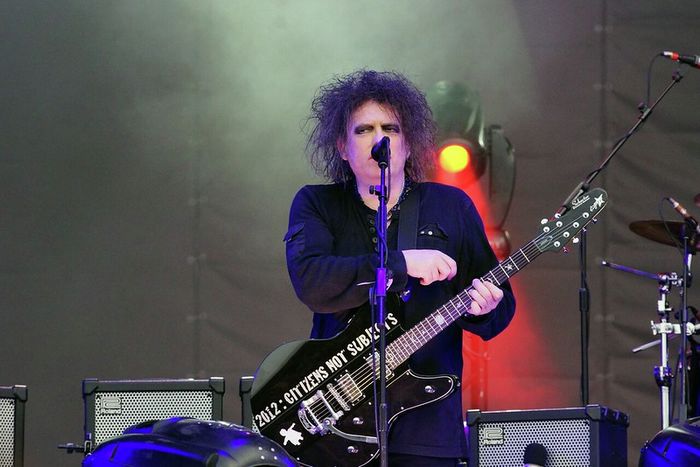A cut above: The Smile heads away from Radiohead
The Smile begins to cut ties with Radiohead’s shadow in Cutouts, crafting a sharper, jazz-infused sound, writes Lara Pennell

Radiohead fans may have been waiting (im)patiently for a new album since the release of A Moon Shaped Pool in 2016, but those following their side project, The Smile, have been treated to their second album this year.
Lead singer Thom Yorke and guitarist Jonny Greenwood first teamed up with drummer Tom Skinner (formerly of Sons of Kemet) in 2020, releasing their debut album A Light for Attracting Attention two years later. That album established them as a thrilling new band, with a diverse sound ranging from the angsty, guitar-driven ‘You Will Never Work in Television Again’ to the mesmerisingly beautiful ‘Free in the Knowledge’. The gradually building ‘Pana-Vision’ was even featured in the series finale of Peaky Blinders.
“Perhaps it’s time to stop viewing The Smile as a Radiohead side-project and appreciate them as their own entity”
Their new album Cutouts may have been recorded in the same sessions as Wall of Eyes, released in January, but it feels distinct. This time, the band seems to push even further into their jazz influences, no doubt propelled by Skinner’s musical background. Fans were challenged to decode Instagram posts to reveal the track list (or, for the less patient among us, to wait for someone to post the answer in the comments), and these techy hints mirror the album’s futuristic, textured soundscape.
It’s no secret that these musicians excel at creating soundscapes. Yorke scored the horror film Suspiria, and Greenwood has composed soundtracks for directors like Paul Thomas Anderson and Lynne Ramsay. In Cutouts, Yorke lyrically builds worlds, as is his trademark. He opens the album with the line, “In a beautiful world we are melting”, on the first track ‘Foreign Spies’, only to later conclude, “It’s a beautiful world”. The repeated lyric doesn’t romanticise, but instead sets the stage for the album — a reflection on our current reality, at least for the time we’re immersed in these songs.

Interestingly, the music offers the hope to counterbalance Yorke’s existential lyrics. This tension runs throughout the album. In ‘No Words’, Yorke repeats, “No words can ex- / No words can ex- / No words can express it”. But, despite this declaration, Yorke has never lacked the ability to express himself, often considered one of his generation’s finest lyricists. We see a similar spiral in ‘Bodies Laughing’, where Yorke laments, “We can’t control it anymore”. However, while the lyrics speak of loss of control, the music itself is meticulously crafted, showing the band’s undeniable command over their art.
‘Tiptoe’ is a prime example of this. It’s one of the simpler tracks on the album, composed of a piano melody that aligns with Yorke’s vocals, accompanied by the strings of the London Contemporary Orchestra. Here, restraint is the epitome of control. Not every track needs intricate polyrhythms to showcase the band’s skill; the variety across the album allows for moments of complexity and simplicity alike, making the overall journey even more impactful. The Smile embrace both simplicity and intricacy, and every track is impressive in its own right.
It’s important to view Cutouts as a cohesive whole. The Smile have come a long way since Radiohead’s early days with breakout singles like ‘Creep’ — a song they famously called their “Iron Lung” in subsequent albums, symbolising the genre trap they had to escape. The standout tracks from Cutouts will likely be subjective (so far, mine are ‘Eyes & Mouth’ and ‘Zero Sum’), and the singles leading up to the album seem more about showcasing the band’s overall tightness and musical mastery than highlighting obvious hits. This may make The Smile seem less accessible at first glance, but songs like ‘The Slip’ reveal an undeniable groove, and these playful corners of the album become more apparent with each listen.
Perhaps it’s time to stop viewing The Smile as a Radiohead side-project and appreciate them as their own entity. They seem here to stay — and with music of this calibre, we have no reason to complain.
 Comment / Plastic pubs: the problem with Cambridge alehouses 5 January 2026
Comment / Plastic pubs: the problem with Cambridge alehouses 5 January 2026 News / Cambridge academics stand out in King’s 2026 Honours List2 January 2026
News / Cambridge academics stand out in King’s 2026 Honours List2 January 2026 News / Cambridge businesses concerned infrastructure delays will hurt growth5 January 2026
News / Cambridge businesses concerned infrastructure delays will hurt growth5 January 2026 News / AstraZeneca sues for £32 million over faulty construction at Cambridge Campus31 December 2025
News / AstraZeneca sues for £32 million over faulty construction at Cambridge Campus31 December 2025 Interviews / You don’t need to peak at Cambridge, says Robin Harding31 December 2025
Interviews / You don’t need to peak at Cambridge, says Robin Harding31 December 2025










